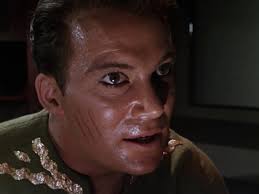I just finished re-watching the sixth episode of the first season of the original Star Trek (if you count the pilot.) It does a fair job of illustrating the basics regarding the dangers of non-acceptance and non-integration of the shadow-self with the persona. These are terms Carl Jung used largely to replace Freud's terms, "conscious" and "subconscious." (The persona being the self we tend to show the world- often our "best" attributes- while the shadow-self is largely unconscious and comprised of aspects of ourselves that society, culture or family have told us are "bad.") If explored, accepted and integrated the shadow-self provides us with much of our creative energy and power. In this particular episode, an alter ego of Kirk is sent back with the original Kirk to the SS Enterprise when the transporter malfunctions.
The alter ego is evil while the other version of Kirk slowly becomes comprised of nothing but apersona containing "good" and socially acceptable characteristics. Neither version is able to function well independently and it becomes apparent that the "evil" side can't be killed because the "good" side is unable to make decisions and has lost the strength of will, putting the crew and ship in danger. I am by no means claiming this the most comprehensive view of Jung's theory but I was surprised to see it portrayed as well as it was in, of all things, an early Star Trek episode. Quite enjoyable watching. (And one of William Shatner's more dramatic performances if that can be believed.)
Star Trek fans (and the rest of you) might enjoy this episode. Click here to access information on the episode via IMBD. It's currently being hosted on Netflix.
